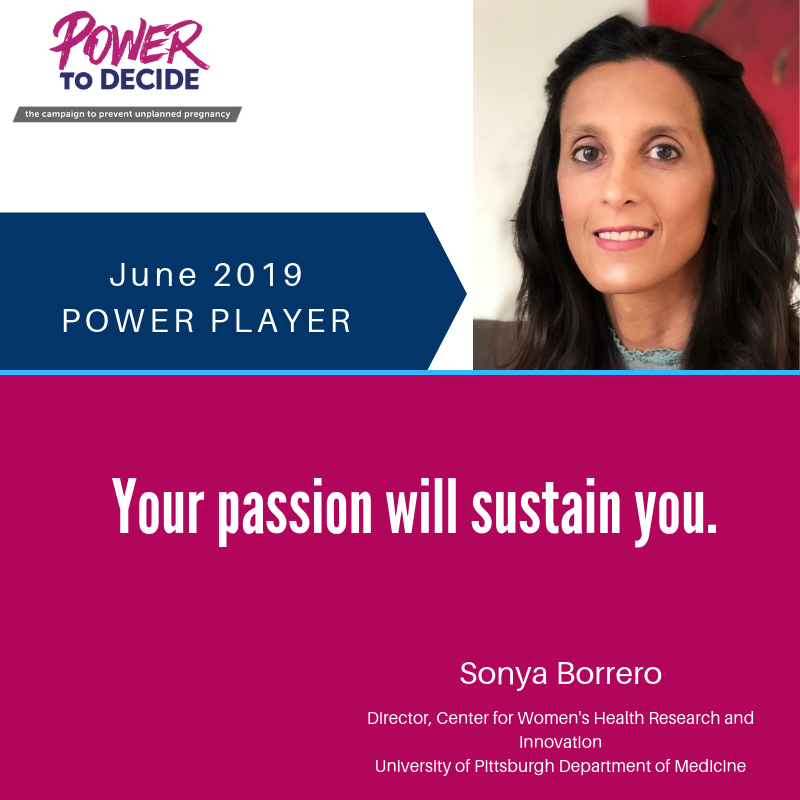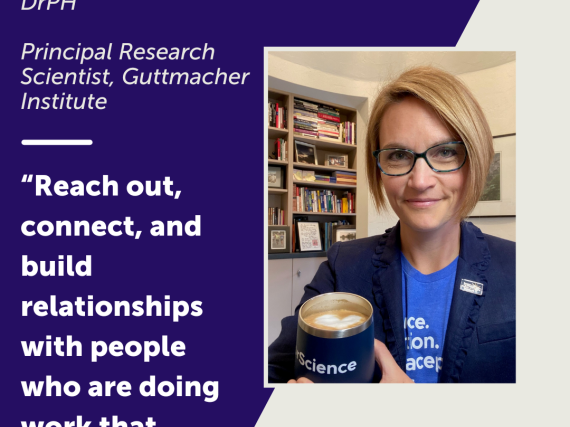June 2019 Power Player
At Power to Decide, we’re committed to uplifting the many individuals on the ground doing the work that matters most. Each month we highlight an individual who is championing the effort to give young people the power to decide if, when, and under what circumstances to get pregnant and have a child. Check out this month's Power Player profile.
Sonya Borrero
Associate Professor of Medicine and Director, Center for Women's Health Research and Innovation, University of Pittsburgh Department of Medicine
What work have you done to ensure that young people have access to high-quality sexual health information or high-quality contraceptive services so that they can decide if, when, and under what circumstances to get pregnant and have a child?
As an internist much of my work focuses on the adult population, but within that population I certainly see young adults. Over the course of my career I’ve attempted to understand how socio-cultural, relational, and structural factors as well as health care experiences shape pregnancy intention and birth control decision making. What I’ve learned is that the strict pregnancy planning paradigm that we’re taught doesn’t match women’s lived realities around how they experience pregnancy or use birth control. For the last few years, we’ve worked to uncover and challenge the assumptions and biases that we (health care providers) have around sexual and reproductive health and wellbeing. As providers we need to ask, “How do we meet women where they are and get them to where they want to be, not where we want them to be?”
In my center at Pitt, we’ve recently started a new collaborative to develop patient-centered decision support tools to help ensure that people have the information they need to make not only informed, but value-concordant decisions around birth control and pregnancy. We developed these tools for adult populations, but we’re working with colleagues in Pediatrics to make sure that they’re responsive to adolescents’ needs too.
How did you get started in your field? What is your driving force?
During residency, I began to explore how I could combine my clinical interests in family planning with my broader commitment to health care equity. I happened to read an historical fiction novel set in India during the State of Emergency in the 70s, which described a vigorous program of forced sterilization - a history that I’m embarrassed to say I knew nothing about at the time. As I sought more information about it, I learned more about the history of coercive sterilization US among similarly marginalized populations. I started a research program during my fellowship to investigate why women of color and lower income woman experience sterilization at higher rates and was particularly interested in whether we, as a medical community, were consciously or unconsciously steering marginalized women to a permanent method of birth control.
The answer to that question is complicated, but what continues to motivate me is that I’ve become incredibly passionate about ensuring that all people can realize the basic human right to decide if, when, and under what circumstances to form a family. I’ve continued to learn more and more about the important and often unrecognized constraints that limit people’s reproductive freedom. I hope to bring these to the surface and make sure they’re addressed through public policy, health care interventions, and cultural change.
What advice would you give to someone looking to effect change in the field that you currently work in?
This is a hard field to work in; it’s challenging, and it’s often perceived as “too controversial” or “too political” for funders. Tapping into your passion is critical. There are so many setbacks and dead ends. I’m amazed by some of my colleagues who have been instrumental in making sweeping changes to improve contraceptive and abortion access and care; while I would love to be able to do that, as a researcher I’m ok with the small, incremental pieces of knowledge that I can add to the field. That’s the nature of research. I keep plugging forward and trying different avenues to effect change from working with policy makers to clinical systems to trainees. Your passion will sustain you.
Why should someone care about ensuring that all people—regardless of who they are or where they live—have access to the information and contraception they need to live their best life story?
For many people, forming families is a core essence of their humanity. So we must ensure that people can make decisions around family planning in ways that reflect their unique context, desires, and needs. We live in a society that has constrained that freedom for so many people in myriad ways; we need to recognize and address that.
Is there a highlight of your work in conjunction with our organization that you’d like to share?
I’m on the Steering Committee for the Reproductive Well-Being Framework. I’m very excited about it and I appreciate that Power to Decide is willing to respond to our current socio-political reality in which we must explicitly make a commitment to inclusion, diversity, and equity if we hope to become a more just society.
They’re willing to dive into the difficult area of measurement and to think about what matters when people seek and receive health care services around family planning. We’re moving away or at least supplementing our traditional metrics and benchmarks to grapple with the larger concepts of reproductive well-being and patient experience. Many of us have struggled with these measurement issues and outcomes in our research and I’m happy to be part of a group dedicated to thinking about this.
*Responses have been edited for clarity



